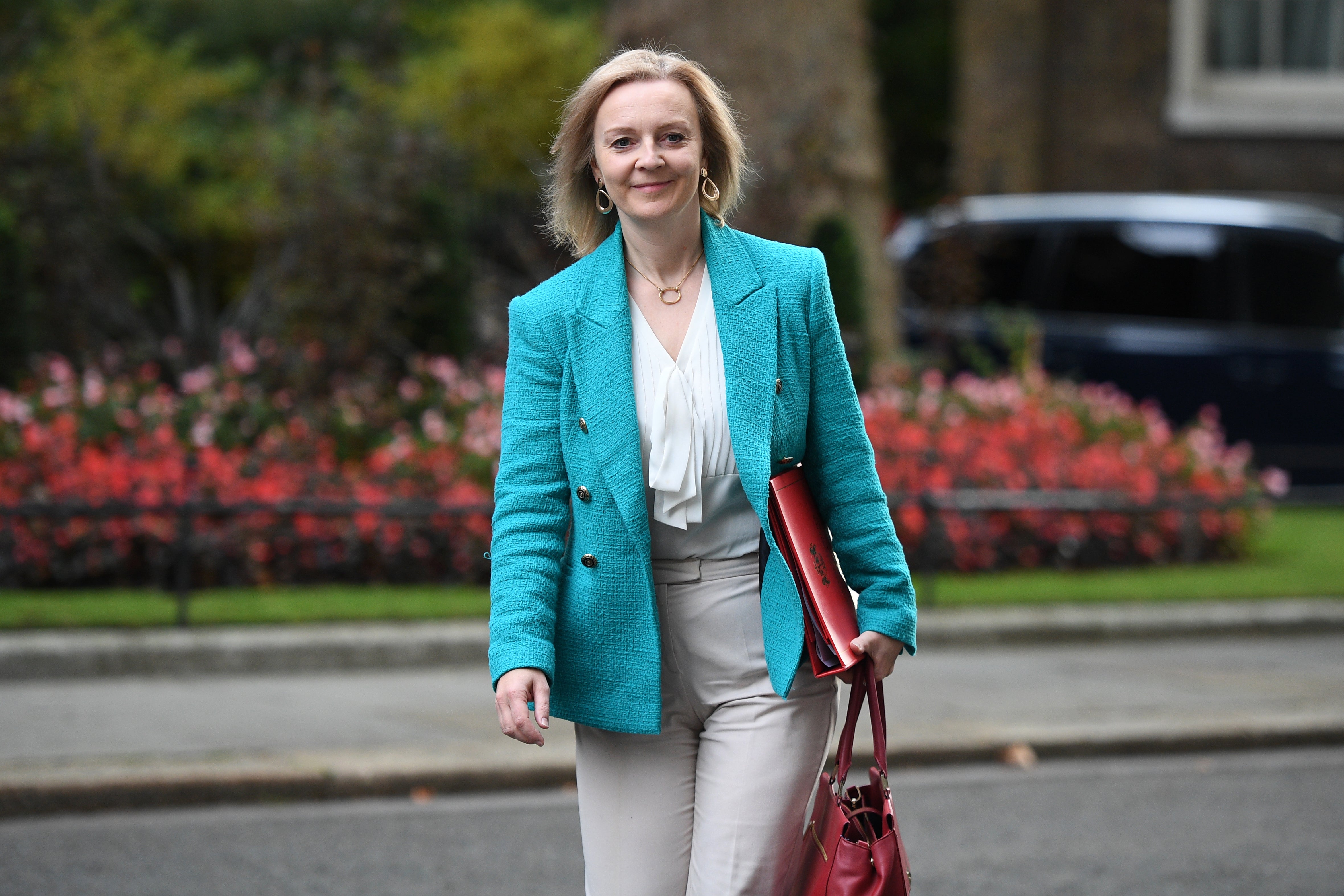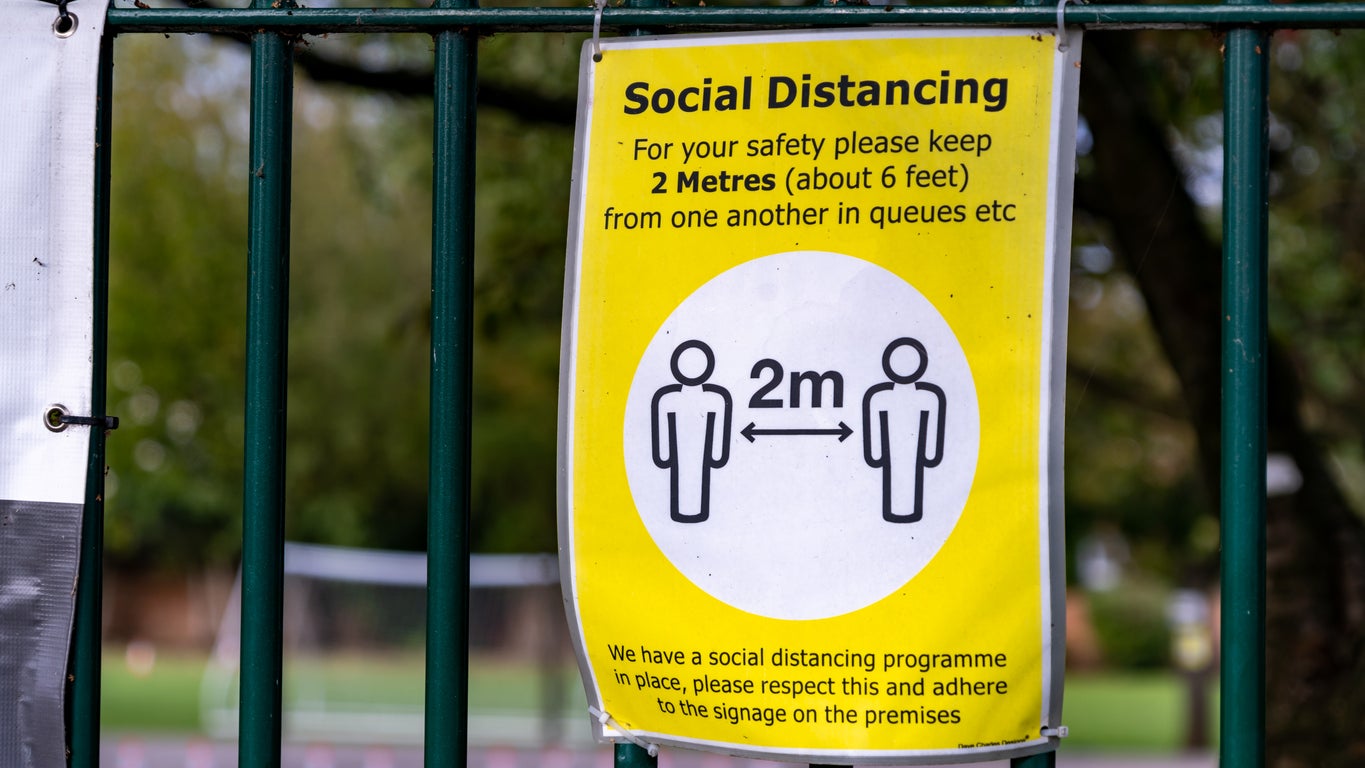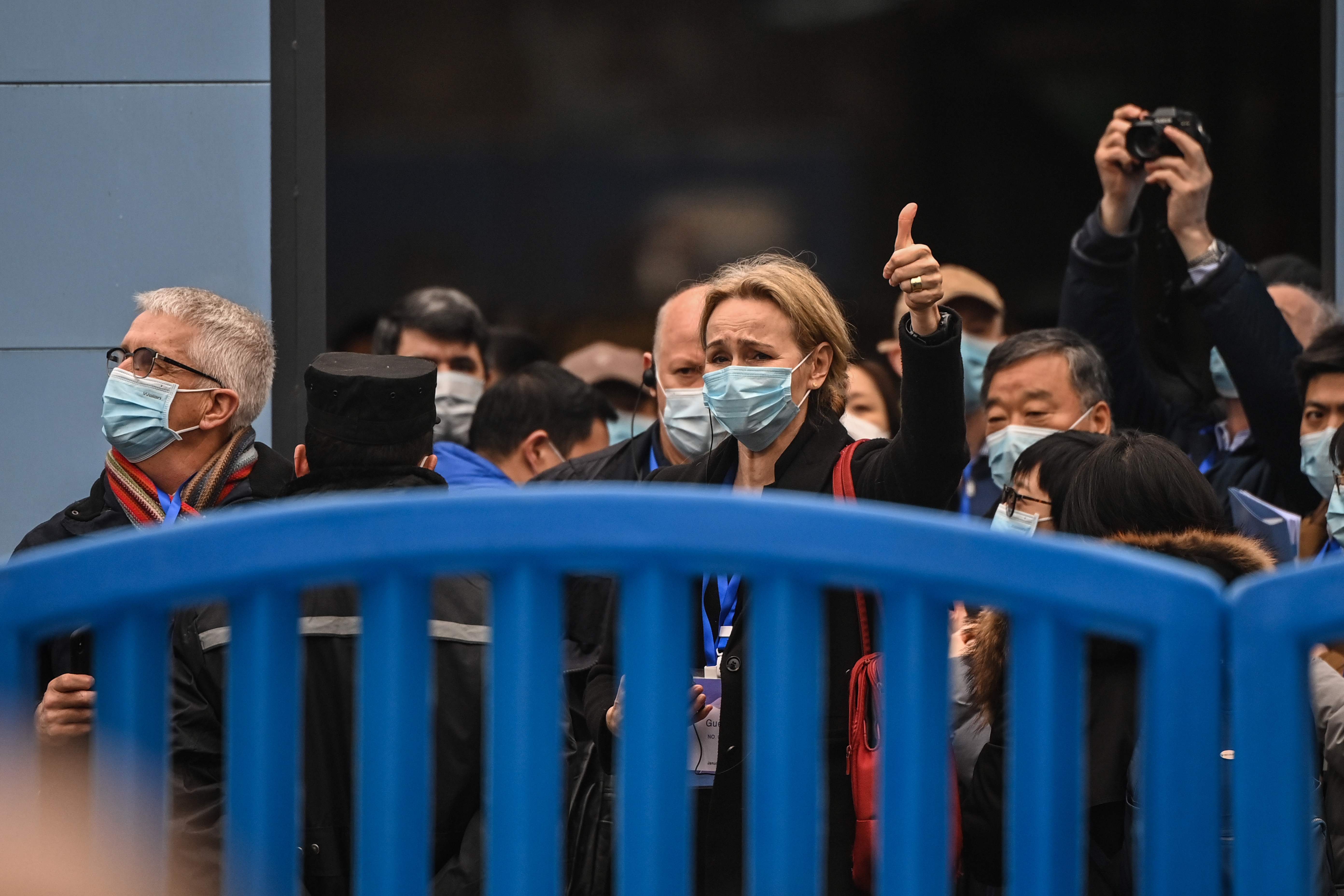Covid news - Hancock predicts ‘happy and free’ summer as UK sees record day for vaccinations
Follow for the latest news as it happens
Your support helps us to tell the story
From reproductive rights to climate change to Big Tech, The Independent is on the ground when the story is developing. Whether it's investigating the financials of Elon Musk's pro-Trump PAC or producing our latest documentary, 'The A Word', which shines a light on the American women fighting for reproductive rights, we know how important it is to parse out the facts from the messaging.
At such a critical moment in US history, we need reporters on the ground. Your donation allows us to keep sending journalists to speak to both sides of the story.
The Independent is trusted by Americans across the entire political spectrum. And unlike many other quality news outlets, we choose not to lock Americans out of our reporting and analysis with paywalls. We believe quality journalism should be available to everyone, paid for by those who can afford it.
Your support makes all the difference.The UK will face a tough few months before enjoying a “happy and free” summer, Matt Hancock said as a record 600,000 people received their first vaccine dose in a day..
“I have a high degree of confidence that by then the vast majority of adults will have been vaccinated,” the health secretary said. So far nearly nine million people have been given a first dose.
It came as the government sought to de-escalate tensions in its row with the European Union over the supply of Covid-19 vaccines, even offering to “help” Brussels amid the ongoing pandemic.
Ministers expressed confidence that the European Union will not block vaccines entering the UK and two sides agreed to a “reset” in relations.
Michael Gove, the Cabinet Office minister, said on Saturday that the EU recognises it “made a mistake” and Dominic Raab, the foreign secretary, said he was “reassured the EU has no desire to block suppliers fulfilling contracts for vaccine distribution to the UK”.
After emergency talks between Boris Johnson, Irish premier Micheal Martin European Commission president Ursula von der Leyen, Mr Gove said vaccines from Pfizer and AstraZeneca are expected to be supplied to the UK as planned.
- Gove strikes conciliatory note with offer to ‘help’ EU in coronavirus vaccine supply row
- Social distancing ‘may be in force until 2022’, Sage study suggests
- I’m a Covid vaccinator and thousands of doses are being thrown away every day – it’s an outrage
- Labour warns one in three hospitality businesses fear collapse before lockdown ends
- The EU vaccine disaster has played into Boris Johnson’s hands
Blair: Very strong case for vaccinating teachers
Tony Blair has said there is a “very strong case” for teachers to be vaccinated before schools are reopened to all students in England, which the government has earmarked for 8 March.
The move would require a delay for some older people to receive the jabs, but it is not suggested it starts before the top four priority groups are vaccinated, which is aimed for mid-February.
“Well, I am suggesting I would push back,” Mr Blair said.
"If it’s 500,000 people it is two days of vaccination.
“I think that is a reasonable thing to do in these circumstances if it helps allow you to get the schools back sooner.”
Liz Truss says ‘too early’ to talk of UK giving excess Covid vaccines to other countries
Liz Truss has said it is too early to talk about the UK giving excess coronavirus vaccine doses to other countries.
She insisted the government was committed to its plan to vaccinate every adult by the autumn.
But she said it was in Britain’s best interests to ensure other countries also had large numbers of jabs – to halt the spread of the virus around the world.
Kate Devlin, our Whitehall editor, has the full story:

Liz Truss says ‘too early’ to talk of UK giving excess Covid vaccines to other countries
International Trade Secretary Liz Truss has said it is too early to talk about the UK giving excess coronavirus vaccine doses to other countries.
Social distancing may be in force until 2022, Sage study suggests
Social distancing rules could remain in force until 2022 unless vaccination significantly reduces the spread of coronavirus, according to government advisers.
Scientists have warned ministers that a jab would have to be 85 per cent effective at stopping transmission as well as severe illness to prevent another spike in deaths, The Sunday Telegraph reported.
Our reporter Peter Stubley has more on this:

Social distancing ‘may be in force until 2022’, Sage study suggests
Relaxation of social-distancing measures will cause another surge in deaths unless vaccination is a success, study warns
Give people second dose of another vaccine rather than no second dose, government immunisation advisors say
Professor Anthony Harnden, the deputy chair of the Joint Committee on Vaccination and Immunisation (JCVI), said people should have a second dose of another vaccine, rather than no second dose, if supply issues make it impossible to have two doses of the same medicine.
He told BBC Breakfast: "The key thing at the moment from the JCVI perspective is to try and get the same vaccine for the second dose as the first dose.
"We are recommending a second dose because that’s important for long-term protection and it will be interesting to see on the supply side whether we can deliver that.
“If we can’t deliver that, JCVI advice is that it’s better to have a second dose of a different vaccine than no second dose at all, and there’s no theoretical reason why you can’t mix vaccines, just the studies are ongoing at the moment.”
Philippines expects 5.6 million vaccine doses to arrive by end of March
At least 5.6 million doses of two international Covid-19 vaccines are expected to arrive in the Philippines in the first quarter of the year, the chief of the country’s coronavirus task force said on Sunday.
The initial volume is part of the 9.4 million doses of the two vaccines – one developed by Pfizer Inc and BioNTech and the other by AstraZeneca – that are expected to be shipped in the first half, said Carlito Galvez, who also handles the government’s vaccine procurement.
Mr Galvez said he has received a letter from Aurelia Nguyen, the managing director of the World Health Organisation-led Covax Facility, informing the Philippine government of the shipment schedule and volume.
WHO teams visits Wuhan food market in search of virus clues

A World Health Organisation team looking into the origins of the coronavirus pandemic on Sunday visited the market in the Chinese city of Wuhan that was linked to many early infections.
The team members visited the Huanan Seafood Market for about an hour in the afternoon, and one of them flashed a thumbs-up sign when reporters asked how the trip was going.
The market was the site of a December 2019 outbreak of the virus. Scientists initially suspected the virus came from wild animals sold in the market. The market has since been largely ruled out but it could provide hints to how the virus spread so widely.
“Very important site visits today — a wholesale market first and Huanan Seafood Market just now,” Peter Daszak, a zoologist with the US group EcoHealth Alliance and a member of the WHO team, said in a tweet. “Very informative and critical for our joint teams to understand the epidemiology of Covid as it started to spread at the end of 2019.”
Earlier in the day, the team members were also seen walking through sections of the Baishazhou market — one of the largest wet markets in Wuhan — surrounded by a large entourage of Chinese officials and representatives. The market was the food distribution centre for Wuhan during the city’s 76-day lockdown last year.
The members, with expertise in veterinary medicine, virology, food safety and epidemiology, have so far visited two hospitals at the centre of the early outbreak — Wuhan Jinyintan Hospital and the Hubei Integrated Chinese and Western Medicine Hospital.
The mission has become politically charged, as China seeks to avoid blame for alleged missteps in its early response to the outbreak.
A single visit by scientists is unlikely to confirm the virus’s origins. Pinning down an outbreak’s animal reservoir is typically an exhaustive endeavour that takes years of research including taking animal samples, genetic analysis and epidemiological studies.
One possibility is that a wildlife poacher might have passed the virus to traders who carried it to Wuhan. The Chinese government has promoted theories, with little evidence, that the outbreak might have started with imports of frozen seafood tainted with the virus, a notion roundly rejected by international scientists and agencies.
Lockdown easing must be done very slowly, very cautiously, PHE says
Dr Susan Hopkins, the Covid-19 strategic response director at Public Health England, has warned that relaxing lockdown measures would have to be done “very slowly, very cautiously” to avoid a surge in infections.
“We have learnt, as we did on the first occasion, we have to relax things really quite slowly, so that if cases start to increase we can clamp down quite fast,” she told BBC One’s The Andrew Marr Show.
"The NHS is going to be under pressure until the end of March, as normal in winter, but even more so with the amount of inpatients they still have with Covid-19.
“Any releases that we have will have to happen very slowly, very cautiously, watching and waiting as we go, with a two-week period to watch and see the impact of that relaxation because it takes that to see what's happening in the population.”
Meanwhile, Dr Hopkins said experts expect to see an impact of the coronavirus vaccine on the over-80s over the next two weeks.
Asked if there was evidence the vaccination programme was beginning to reduce infections, she said: "We are seeing declines in all age groups at the moment.
“We’re starting to see declines in the over-70s and over-80s. It’s a bit early to say whether those declines are directly related to the vaccine.
“What we would like to see is a divergence in the case rate in the over-70s and over-80s who have been vaccinated from the younger age groups, to show that they are declining faster.
“We have now hit 80 per cent of the over-80s being vaccinated and really fast numbers climbing in the under 80-year-old age group as well.
“We expect over the next two weeks to start seeing that impact of that vaccine in that age group, and also an impact on hospitalisation.”
Prioritise frontline workers, Labour says
Rachel Reeves has suggested frontline workers should get greater priority for vaccination because they are more at risk of contracting coronavirus.
The shadow Cabinet Office minister told Sky’s Sophy Ridge on Sunday: "We know that some people, because of the work they do, are more exposed to the virus.
"If you are lucky enough to be able to work from home, you've got a car when you do need to get out, then you are less at risk to being exposed to the virus than if, say, for example, you are a bus driver, or a taxi-driver, or you work in a supermarket or you work on the front line in the police.
"If you work in those jobs you are more exposed to the virus, so what Labour are saying is can the JCVI, the Joint Committee on Vaccinations and Immunisations, look at how we can ensure that those people who are most exposed to the virus can get access to it at a bit of an earlier stage. I think that is the right thing to do."
Later on The Andrew Marr Show, Rachel Reeves reiterates Labour’s call to vaccinate all school teachers and support staff during the February half-term.
We all have collective responsibility with surplus vaccines, Ireland’s premier says
All of us have a collective responsibility to vaccinate frontline workers in developing nations with surplus vaccines, Ireland’s premier has said.
Micheal Martin also disagreed with the assessment of Northern Ireland’s first minister Arlene Foster that the EU displayed an “act of hostility” on Friday evening by triggering Article 16 of the Brexit Protocol over the supply of coronavirus vaccines.
“My observation is that the terrible row is an acrimonious row between AstraZeneca and the (EU) Commission over the contractual obligations of the company in respect of supplying vaccines to European member states took centre stage here, and people were blindsided by the decision that was taken and the implications for the Protocol,” he told the BBC’s Andrew Marr Show.
The Taoiseach stressed it took four years to negotiate the Protocol to facilitate access for Northern Ireland’s economy to the single market as well as to the UK market and to avoid a hard border on the island of Ireland.
"It’s a good thing, the Protocol, overall. There are issues there that we have to fine-tune and work out, but essentially I think there are positives there medium-term for Northern Ireland in terms of its economic development which we should not underestimate.
“We are only four weeks into the operation of the Protocol, there are bound to be teething problems but I do acknowledge the need for engagement here on all sides, between the European Union, the United Kingdom and the Irish Government, and the Northern Ireland Executive.”

Join our commenting forum
Join thought-provoking conversations, follow other Independent readers and see their replies
Comments